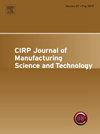Developing a data-driven system for grinding process parameter optimization using machine learning and metaheuristic algorithms
Abstract
Grinding is one of the most widely employed machining processes in manufacturing. Achieving a successful grinding process characterized by low fault rates and short cycle times can significantly improve overall productivity and process efficiency. Nonetheless, finding optimal values for grinding process parameters is challenging due to complex underlying dynamics. Therefore, this work proposes a data-driven system that exploits various machine learning techniques and metaheuristic optimization algorithms to optimize grinding process parameters. Using data collected from grinding processes, the proposed system constructs a machine learning-based fault detection model and employs that model to define variable range constraints. In addition, a Gaussian process-based cycle time estimation model is developed. Process parameter optimization is performed using various metaheuristic algorithms based on the aforementioned methods. Experiments with actual internal cylindrical grinding process data have proven the proposed system’s effectiveness during process parameter optimization. Furthermore, real-world validation data verifies the final optimization solution, reducing the fault rate and process cycle time by 77.83% and 17.64%, respectively. In-depth interviews with six domain experts in the grinding process also verify the proposed system’s validity and real-world applicability. The proposed data-driven system is expected to bring substantial improvements in process productivity, especially when applied to manufacturing sites in practice.

 求助内容:
求助内容: 应助结果提醒方式:
应助结果提醒方式:


